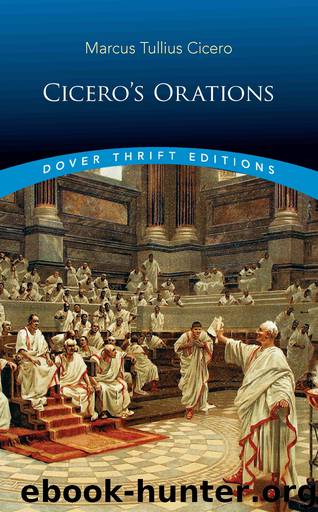Cicero's Orations by Marcus Tullius Cicero

Author:Marcus Tullius Cicero
Language: eng
Format: epub
Publisher: Dover Publications
Published: 2018-03-18T16:00:00+00:00
* * *
1 This was an extraordinary trial, held under a new law just passed by Pompey; and it was presided over, not by the prætor, but by Lucius Domitius Ahenobarbus, who was expressly appointed by the comitia president of the judges on this occasion.
2 Pompey was present at the trial, surrounded by his officers, and he had filled the forum and all its precincts with armed men, for the sake of keeping the peace.
3 Munatius Plancus, the day before, had exhorted the people not to suffer Milo to escape.
4 After Clodius’s death, Munatius Plancus, the tribune, exposed his body on the rostrum, and harangued the people against Milo; the populace carried the body into the senate-house, and made a pile of the seats to burn it, in doing which they burnt the Senate-house, and Plancus himself with difficulty escaped.
5 Literally, “this wholesome letter, as well as that melancholy one.” The letter A was the “wholesome ” letter, being the initial of absolvo, I acquit; the letter C the melancholy one, being the initial of condemno, I condemn.
6 After the death of Tiberius Gracchus, Publius Æmilianus Africanus Scipio, the conqueror of Carthage and Numantia, was known to be hostile to the agrarian law, and threw every obstacle in the way of it; his enemies gave out that he intended to abrogate it by force. One morning he was found dead in his bed without a wound. The cause and manner of his death were unknown; some said it was natural; some, that he had slain himself; some, that his wife Sempronia, the sister of Gracchus, had strangled him. His slaves, it was said, declared that some strangers had been introduced into the house at the back, who had strangled him, and the triumvir Carbo is generally believed to have been the chief agent in his murder, and is expressly mentioned as the murderer by Cicero, Ep. ad Q. Fr. ii. 3.
7 It was the priest of Juno Sospita, who was the patroness of Lanuvium.
8 The passage in brackets is a very doubtful supplement of Beier; which, however, Orellius prefers to any other.
9 Cicero here supposes Sextus Clodius to look menacingly at him, in order to check him in his attack on this intended law.
10 That is, to Manlius’s camp in Etruria at the time of Catiline’s conspiracy, in which, in all probability, Clodius was implicated.
11 The disturbances on the death of Clodius arose to such a height, that the Senate at last passed a resolution that Marcus Lepidus the Interrex, assisted by the tribunes of the people and Pompeius, should take care that the republic received no injury. And at last the Senate appointed Pompeius consul without a colleague, who immediately published several new laws, and among them the one under which this trial was conducted, and he now limited the duration of trials, allowing only three days for the examination of witnesses, and on the fourth day the accuser was only allowed two hours to enforce the accusation, and the defendant three hours to speak in his defence.
Download
This site does not store any files on its server. We only index and link to content provided by other sites. Please contact the content providers to delete copyright contents if any and email us, we'll remove relevant links or contents immediately.
| Books & Reading | Comparative Literature |
| Criticism & Theory | Genres & Styles |
| Movements & Periods | Reference |
| Regional & Cultural | Women Authors |
4 3 2 1: A Novel by Paul Auster(12393)
The handmaid's tale by Margaret Atwood(7767)
Giovanni's Room by James Baldwin(7346)
Asking the Right Questions: A Guide to Critical Thinking by M. Neil Browne & Stuart M. Keeley(5775)
Big Magic: Creative Living Beyond Fear by Elizabeth Gilbert(5774)
Ego Is the Enemy by Ryan Holiday(5450)
The Body: A Guide for Occupants by Bill Bryson(5098)
On Writing A Memoir of the Craft by Stephen King(4944)
Ken Follett - World without end by Ken Follett(4734)
Adulting by Kelly Williams Brown(4574)
Bluets by Maggie Nelson(4559)
Eat That Frog! by Brian Tracy(4541)
Guilty Pleasures by Laurell K Hamilton(4450)
The Poetry of Pablo Neruda by Pablo Neruda(4109)
Alive: The Story of the Andes Survivors by Piers Paul Read(4033)
White Noise - A Novel by Don DeLillo(4012)
Fingerprints of the Gods by Graham Hancock(4004)
The Book of Joy by Dalai Lama(3986)
The Bookshop by Penelope Fitzgerald(3854)
